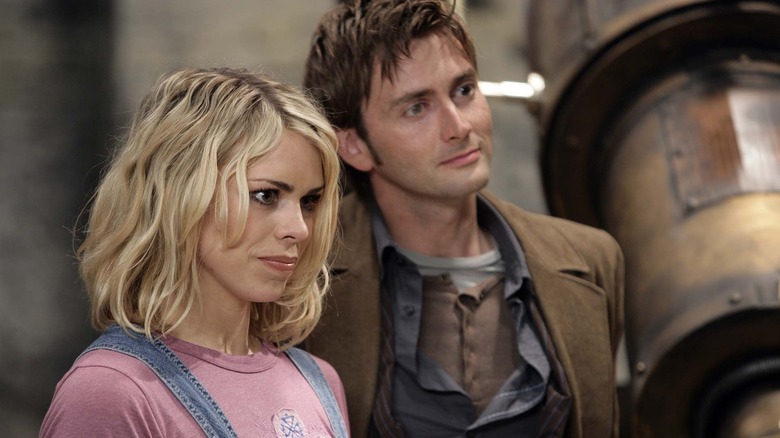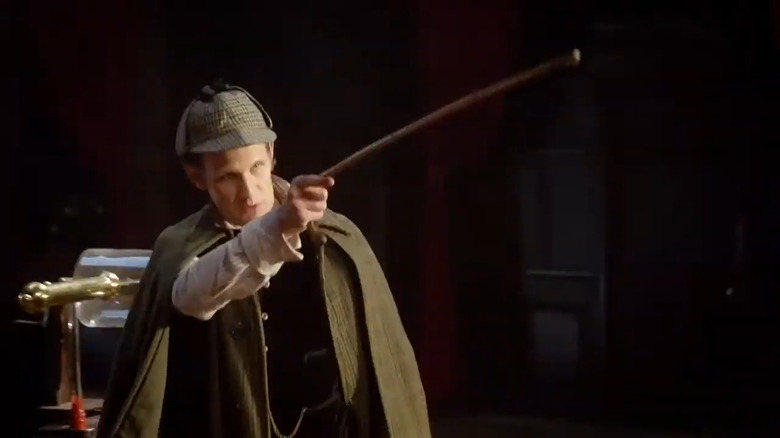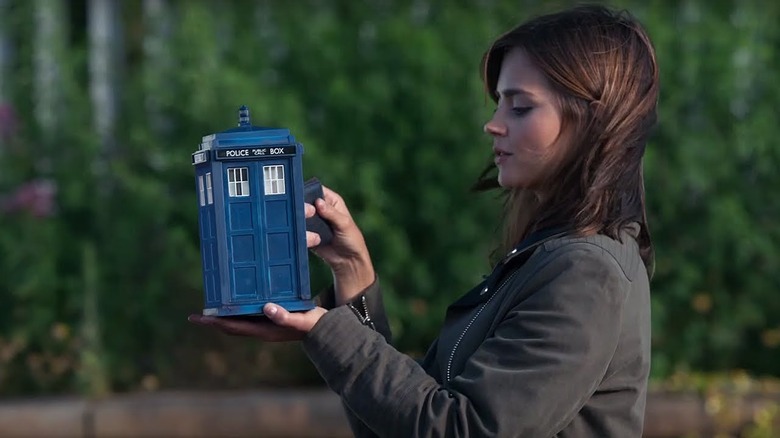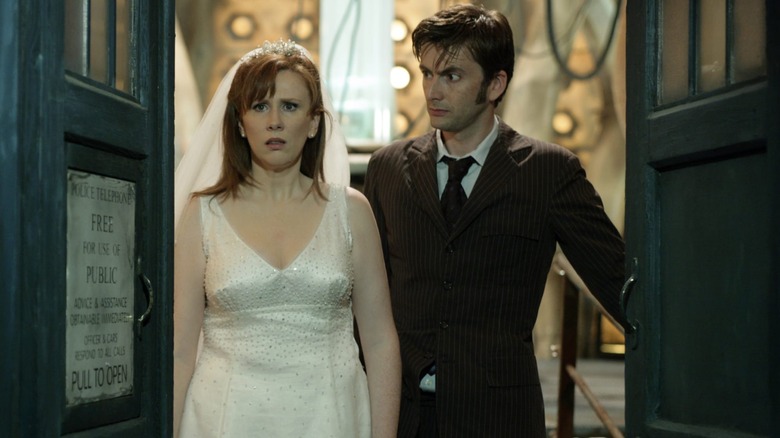Why Russell T. Davies Thinks Writing Doctor Who Is The Toughest Job On TV
One of the reasons "Doctor Who" has been able to consistently stay fresh over its 40-plus seasons of TV is the way the staff behind the show constantly changes. Not only is there a new companion and a new Doctor every few years, but the showrunner and the rest of the writers also tend to shuffle in and out, about one or two times a decade. However, the writing staff doesn't change purely as a strategy for keeping the show in a constant state of innovation; it changes because writing for "Doctor Who" is, as it turns out, really difficult.
The initial showrunner of the revival, Russell T. Davies, considers the show to be "the hardest show to write on television." The reason? Because the Doctor is meant to be a hyper-intelligent person, far smarter than the average human being. Davis said:
"He walks in the door and solves the entire plot in three minutes. And as a writer, you have to spin plates and tap dance and juggle to stop that happening. It makes it very, very hard to write."
It's an issue that led to plenty of questionable storytelling choices over Davies' tenure. Even one of the best episodes of the series, "The Family of Blood," ends with the big crisis being solved by the Doctor spewing a bunch of techno jargon. The Doctor, pretending to be a silly human, falls down and "accidentally" presses a couple of buttons on the aliens' ship, which turn out to be exactly the buttons required to set off the ship's self-destruct button. We can forgive the scene because the rest of the episode rocks, but it can certainly feel a little anti-climactic when the Doctor saves the day through means the audience couldn't possibly understand or predict.
He's not the only showrunner who struggled
It's a similar problem future showrunner Steven Moffat would have to deal with, not just with "Doctor Who," but with his other TV project, "Sherlock." Both the Doctor and Sherlock Holmes are supposed to be inhumanly intelligent characters, which makes it difficult for the writers — who are not inhumanly intelligent — to create mysteries that would require 45 to 90 minutes for the character to figure out.
For the most part though, Moffat was willing to put in the work. The pilot episode of "Sherlock" had Sherlock (Benedict Cumberbatch) deduce a bunch of things about John (Martin Freeman) simply by looking at him for three seconds. Instead of simply telling us Sherlock's observant, the show later has him methodically explain the entire process of deduction that went into the original scene. Some of the deductions he makes are a little ridiculous — he notices scuff marks near a phone's charger, so deduces that the phone's owner must've been an alcoholic with shaky hands — but it does help to believably put the viewer into the mind of a genius detective. It takes him over a minute and a half to explain to John the thought process that went through his head in a matter of seconds. These types of scenes became increasingly less frequent on "Sherlock," possibly because of how time-consuming they were to write.
Although "Doctor Who" never leaned quite as heavy on the Doctor deducing things as Sherlock, the character still had the same basic dynamic with all his companions. To make things even more challenging, "Doctor Who" was coming out with a new 13-episode season about once a year or so, whereas "Sherlock" was averaging three episodes every two years.
The time travel aspect
The other thing making "Doctor Who" far more difficult to write than shows like "Sherlock" is the time travel aspect. As Davies put it:
"He arrived in a great big machine that's the most powerful object in the universe. It travels in time and is invulnerable. He's not in a bad state, it's hard to worry for the Doctor when you put it like that."
As the revival increasingly leaned into the time travel aspect of the show, it became increasingly hard to maintain tension because we knew the show could always pull some kind of wibbly wobbly timey wimey nonsense to save the day. In season 1's "The Doctor Dances," a character seemingly sacrifices his life in an explosion, but the Doctor uses his TARDIS to travel to the exact time and place before the explosion hit, and he materializes around the character just in time to save him. It's a cool moment, but it leads to the question: why doesn't the Doctor do this more often? As longterm fans pointed out, if the Doctor could do something like that, why didn't he do anything the last time a companion died in an explosion? (I guess the Fifth Doctor must not have cared that much about Adric after all.)
This issue became more pronounced in the Moffat years, as it became a regular occurrence for the show to use time travel to repeatedly undo seemingly real character deaths. For a while there, the characters felt invincible, and the show was losing its sense of stakes.
Davies' return
In spite of the difficulties, Moffat went on to run "Doctor Who" for six seasons, and Russell T. Davies is returning to run the show yet again. As tough as the show may be to write for, it's clearly worth the trouble. For Davies, it has to do with the flipside of the Doctor being a hyper-intelligent being with an invincible time machine: as complicated as the show can be, the core of it is always pretty simple, and he's free to take it in any direction he wants.
"I like looking at a new set of challenges every time and a blank page — but 'Doctor Who' is always a blank page," he told Radio Times. "There are things coming up that are brand new ways of telling the stories that have never been done before, so it just feels new."
In addition to taking over as showrunner, he'll also be in charge of the Sixtieth Anniversary special, featuring the return of the tenth Doctor (David Tennant) and Donna (Catherine Tate). It serves as another reminder of the upside of writing a show about time travel: you get the chance to bring back beloved characters for special occasions like these, even though we've already seen how their stories end. We know showrunning again for "Doctor Who" will probably be exhausting for Davies in the long run, but it's certainly nice to have him back for now.



